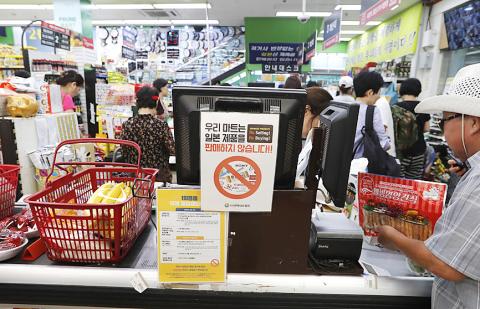Japan yesterday said that it does not plan to retract or renegotiate its stricter controls on high-tech exports to South Korea, a day after South Korean President Moon Jae-in urged that the issue be resolved through diplomacy.
Tokyo last week tightened the approval process for Japanese shipments of photoresists and other sensitive materials to South Korean companies.
Such materials can only be exported to trustworthy trading partners, Japanese officials have said, hinting at security risks without citing specific cases.

Photo: AP
They have rejected suggestions that the move was driven by worsening ties between the two nations related to historical issues.
“The measure is not a subject for consultation and we have no intention of withdrawing it either,” Japanese Chief Cabinet Secretary Yoshihide Suga told a news conference.
He was responding to Moon’s appeal for a diplomatic solution thorough “sincere” bilateral discussions, urging Tokyo to withdraw what he described as a politically motivated measure.
Moon on Monday said that Seoul would be forced to take countermeasures if the restrictions on materials used mainly in semiconductors and displays cause damage to South Korean companies, as the curbs have raised concern over possible disruptions for South Korean manufacturers and global supply chains.
The South Korean Ministry of Trade, Industry and Energy said that Seoul plans to file a complaint with the WTO.
Japan’s trade measures followed South Korean court rulings ordering Japanese firms to compensate South Korean plaintiffs for forced World War II labor.
The export restrictions cover fluorinated polyimides, which are used in organic light-emitting diode screens for TVs and smartphones, as well as photoresist and hydrogen fluoride, used for making semiconductors.
Japanese officials have said that those chemicals are sensitive materials that could be used in fighter jets, radars and chemical weapons, and the decision to tighten controls was based on a lack of trust that posed a risk to national security.
Japanese Prime Minister Shinzo Abe and his aides have hinted that there might have been illegal transfers of sensitive materials from South Korea to North Korea.
South Korea has summoned a Japanese embassy official to protest Abe’s suggestion that it could not be trusted to faithfully implement sanctions against the North, South Korean Ministry of Foreign Affairs spokesman Kim In-chul said.
South Korean Minister of Trade, Industry and Energy Sung Yun-mo said that an “emergency inspection” found no sign of illegal transactions.

DAREDEVIL: Honnold said it had always been a dream of his to climb Taipei 101, while a Netflix producer said the skyscraper was ‘a real icon of this country’ US climber Alex Honnold yesterday took on Taiwan’s tallest building, becoming the first person to scale Taipei 101 without a rope, harness or safety net. Hundreds of spectators gathered at the base of the 101-story skyscraper to watch Honnold, 40, embark on his daredevil feat, which was also broadcast live on Netflix. Dressed in a red T-shirt and yellow custom-made climbing shoes, Honnold swiftly moved up the southeast face of the glass and steel building. At one point, he stepped onto a platform midway up to wave down at fans and onlookers who were taking photos. People watching from inside

A Vietnamese migrant worker yesterday won NT$12 million (US$379,627) on a Lunar New Year scratch card in Kaohsiung as part of Taiwan Lottery Co’s (台灣彩券) “NT$12 Million Grand Fortune” (1200萬大吉利) game. The man was the first top-prize winner of the new game launched on Jan. 6 to mark the Lunar New Year. Three Vietnamese migrant workers visited a Taiwan Lottery shop on Xinyue Street in Kaohsiung’s Gangshan District (崗山), a store representative said. The player bought multiple tickets and, after winning nothing, held the final lottery ticket in one hand and rubbed the store’s statue of the Maitreya Buddha’s belly with the other,

‘COMMITTED TO DETERRENCE’: Washington would stand by its allies, but it can only help as much as countries help themselves, Raymond Greene said The US is committed to deterrence in the first island chain, but it should not bear the burden alone, as “freedom is not free,” American Institute in Taiwan Director Raymond Greene said in a speech at the Institute for National Defense and Security Research’s “Strengthening Resilience: Defense as the Engine of Development” seminar in Taipei yesterday. In the speech, titled “Investing Together and a Secure and Prosperous Future,” Greene highlighted the contributions of US President Donald Trump’s administration to Taiwan’s defense efforts, including the establishment of supply chains for drones and autonomous systems, offers of security assistance and the expansion of

STREAMLINED: The dedicated funding would allow the US to transfer equipment to Taiwan when needed and order upgraded replacements for stockpiles, a source said The US House of Representatives on Thursday passed a defense appropriations bill totaling US$838.7 billion, of which US$1 billion is to be allocated to reinforcing security cooperation with Taiwan and US$150 million to replace defense articles provided to the nation. These are part of the Consolidated Appropriation Act, which the US House yesterday passed with 341 votes in favor and 88 against. The act must be passed by the US Senate before Friday next week to avoid another government shutdown. The US House Committee on Appropriations on Monday unveiled the act, saying that it allocates US$1 billion for the Taiwan Security Cooperation Initiative